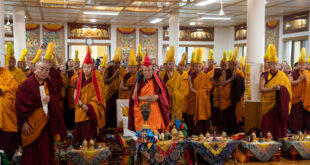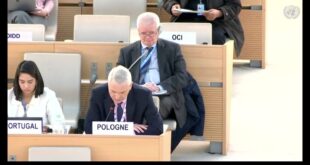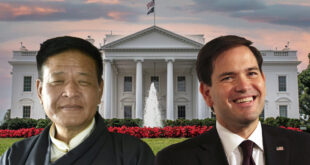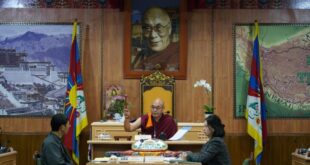tibet.net
February 1, 2014
GUWAHATI: Flying in a helicopter over hills and valleys dotted with Siang river which joins the Brahmaputra flowing from Tibet, Sikyong Dr. Lobsang Sangay arrived on his first ever visit to the remote settlement in Tuting on 30 January, after successfully concluding his tour of Tawang, Derang, Bomdila and Tenzingang in Arunachal Pradesh.
After concluding a day-long programme of meeting and addressing Tibetans and local residents in Bomdila, Tenzingang and Kalakthang on 28 January, Sikyong travelled by road from Tenzingang to Balukpong, from where he flew in a helicopter to Tuting on Wednesday morning. He could not Tuting on Tuesday as scheduled as the helicopter didn’t take off from Tenzingang due to poor visibility.
On arrival at the helipad near the settlement in Tuting, Sikyong was accorded a warm welcome by the Tibetan settlement officer, abbot of Jangchup Dhargyeling monastery, Additional deputy secretary, Itanagar, Extra Assistant Commissioner, Officer In-charge Police, Agricultural Development Officer and the general public.
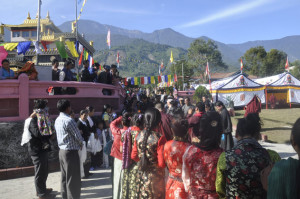
After having the lunch, Sikyong addressed the Tibetan settlement in front of the main monastery surrounded by beautiful hills and thick forest. Sikyong extended his greetings and said he is happy to be able to visit Tuting. He recalled that he had an emotional feeling on reaching Arunachal Pradesh, especially on landing in Tawang, when he told that His Holiness the Dalai Lama passed through the area on his way to exile in March 1959 and where the sixth Dalai Lama was also born.
Reminiscing about his schooldays, Sikyong said he heard a great deal about remote areas like Tuting, Miao and Tezu and had friends like Pema Dechen who is very good in studies and currently holds the post of Agricultural Development Officer in Tuting. He said he also learned to speak few words of Pemakoepa during his schooldays. “So during my recent visits to schools in Kalimpong, Darjeeling and Chauntara, I used to tell the students that a person who speaks few words of Pemakoepa has reached Dharamsala as the Sikyong. So I told them to study hard to join the Central Tibetan Administration and also aim for the top post of Sikyong.”
Sikyong said that in view of problems faced by Tibetans in Tuting and Miao due to their remote location, the Kashag has made efforts to depute CTA officials, who are native of these areas, as Tibetan settlement officers.
He said as an elected leader he has a duty to visit the settlements and know the condition and problems of the general public. “I have visited around 93-94% percent of the settlements, schools and monasteries since I took over the post of Kalon Tripa more than two years ago. Knowing the ground situation in the settlements would help the Kashag to make decisions on welfare programmes.”
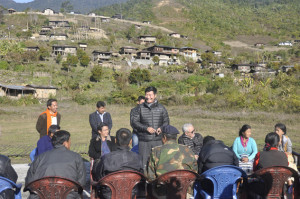
Sikyong reiterated that education is one of the top priorities of the Central Tibetan Administration. He said he has reformed the scholarship programmes to fulfill the needs of the children to pursue further studies and advised the children and their parents to read the scholarship booklet published by the education department. He advised the children to do their best to excel in their studies and urged their parents to support in their endeavor. He also advised the Tibetans to keep themselves of informed of issues facing Tibet and workings of the Central Tibetan Administration in Dharamsala.
The Sikyong took questions from the public and said the Kashag would make its best efforts to solve problems faced by the Tibetans in terms of health and education.
Next morning, the Sikyong travelled to Gelling village, located at an hour-long journey by road from the McMohan Line, the Indo-Tibetan border. Addressing few Tibetan families living there, Sikyong recalled that his mother crossed this village while coming into exile after the complete invasion of Tibet in 1959.
He left Tuting for the Tibetan settlement at Miao.

